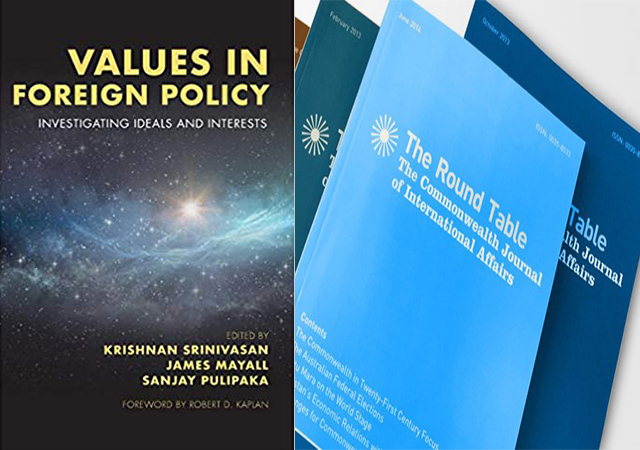
[These excerpts are taken from a book review which appears in The Round Table: The Commonwealth Journal of International Affairs.]
As the Foreword by Robert D. Kaplan claims, ‘Foreign policy is ultimately the extension of a country’s domestic condition’. This, he continues, means that the ‘values’ of that country dictate its foreign policy to a large degree and promote their ‘culture’ as carrying these values to those with whom they interact. And, most ominously, he concludes that when that culture declines so does the impact of those values. This is, therefore, a book that encourages us to read it attentively given that the colonial empires are defunct and the ‘empire’ of their successor the United States is under severe strain. Will the ensuing decline mean we are headed for a world where the values that these imperial countries arguably spread across the planet, notably democracy, the rule of law, free trade, even more indefinable currencies like ‘fair play’ and equality of opportunity for all, are equally in for a rough ride? Given the majority of our newspaper headlines, we need to fear that this might indeed be the case. One key question posed here (in the excellent editorial introduction) is whether we can point to most ‘important’ states giving an at least minimalist loyalty to the concept of ‘international society’ in a world that is essentially anarchic? This concept encompasses a belief that there are core values to which all states try to adhere, or alternatively, as many now believe, do they accept that ‘anarchy is what states make of it’? If the latter, does anything go? The auguries are not good.
———————————————————————————————————-
Does this book live up to its high billing as a key to these mighty questions? I have not got the space to analyse all the claims in this fact-filled volume, all of which are well written. The countries selected are not all ones who previously won out in the major conflicts of the twentieth century, but all of them can be deemed successful in terms of their position in the pecking order of influence. Several of them, like Germany and Japan, were losers in the world wars but have since flourished, or were ‘winners’ who then became dissidents, like China and Russia. Arguably, many of the others do not share all the core values of the ‘West’ and increasingly assert their right to be different. Views on gender and sexual orientation are obvious fields of disagreement, and these are on show even within the European Union. But the Russian and Chinese examples, among many, show a desire to promote nationalism, aka self-interest, over ‘values’. The authors do ask if there could be said to exist any Western or Asian ‘discrete set of values’ and how they might overlap or contradict each other, but all I can see is the assertion of nationalism often dressed up in the garb of religion. ‘Solidarism’ is in short supply over the importance of human rights. It is also open to question as to where values come from. My own instinct is to see the inevitable setting up of an impossible binary – can we really say that the West has ever had a monopoly on how human beings should treat each other, we who gave the world the notions of colonialism, not to mention crimes against humanity and genocide?
Japan, for example, tried very hard to emulate the highest values for the treatment of prisoners of war in 1905, and backed the Allies in 1914–1918, only to find itself rejected by that great advocate of self-determination Woodrow Wilson for being the ‘wrong’ colour after 1919. After humiliating and devastating defeat in 1945, as the author of the chapter on Japan points out, it became a state dedicated to the promotion of peace. But the values that brought Japan to its knees are still present in many hearts and minds. China has had good reason to resent its humiliation by the West (and Japan) while being forced to listen to homilies about rights and justice. Where the United States, Germany and many other countries developed behind tariff and non-tariff barriers, China has had to constantly submit to ‘open door’ policies and now their more recent successors. Those are just obvious examples (and any citizen of most of the other states that figure here might come up with similar complaints), but they are not cheap shots to make. It must be said that the editors are aware of this problem, and it is made more difficult when the foundational liberalism of the West, genuinely admired elsewhere, is under such attack from within.
There is indeed a lot of food for thought in this volume. Anyone who has studied conflict resolution, or tried doing it, will know that the parading of historical wrongs and cultural misunderstandings are the essence of the discussion of the problems with any current relationship. South Korea’s and China’s foreign policy disagreements with Japan are clearly based on what are now termed ‘history wars’, ones that have important cultural, trade and diplomatic implications. The main virtue of the book might be said to show how for years all of the countries examined here felt they had to dance to a tune designed by the West, but now they are looking elsewhere, and mainly looking inwards.
Andrew J. Williams is with the School of International Relations, University of St. Andrews
Values in foreign policy: investigating ideals and interests edited by Krishnan Srinivasan, James Mayall and Sanjay Pulipaka, London and New York, Rowman and Littlefield, 2019.



